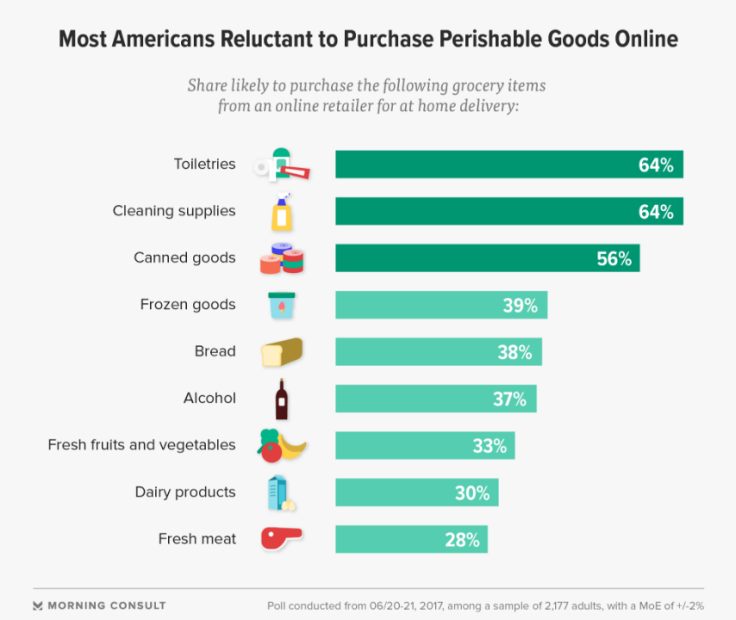Amazon Whole Foods Acquisition: Will People Actually Buy Groceries Online?

Amazon’s Whole Foods acquisition could bring in more Prime customers, a recent Morning Consult survey indicates.
After Amazon announced earlier this month it will buy Whole Foods for $13.7 billion, Morning Consult surveyed 2,000 U.S. adults June 20-21. The participants were asked about the acquisition, including how the deal would affect their grocery shopping and how much they’re willing to pay for an online grocery delivery service.
Read: With Whole Foods, Amazon Could Win Access To Food Stamp Funding — But No One Knows How Much
More Prime Memberships?
It’s no secret that Whole Foods was struggling before the acquisition, but Amazon’s move has given the supermarket chain a brand boost. The survey found 39 percent of respondents said the news gave them a more favorable attitude toward Whole Foods.
Meanwhile, 45 percent said the acquisition gave them a more favorable view of the online retailer.
Amazon is ahead in the race as it leads online grocery rivals. The survey found 42 percent said they have used AmazonFresh, compared to 12 percent who said they used PeaPod, which operates in 24 U.S. markets, and 12 percent who said they used InstaCart, a same-day grocery delivery service.
Amazon’s Whole Foods acquisition could add more Prime customers. The survey found 28 percent of respondents said they were more likely to get a Prime membership because of Amazon’s acquisition of the supermarket chain.
Will Americans Buy Amazon-Whole Foods Items Online?
Americans are skeptical about purchasing their groceries online, with younger people more likely to do so, the survey found.
Read: Amazon Echo Vs. Apple HomePod: Which Device Do Consumers Want?
Some people said they are likely to buy some products, like canned goods online, instead of more perishable items, such as fresh meat.
The poll found 56 percent of people said they would buy canned goods from an online grocery service while 64 percent said they were comfortable with toiletries and cleaning products being delivered to their homes when purchased online.
Other items didn’t fare as well with 68 percent saying they were not likely to have meat products delivered to them. Furthermore, 66 percent of people said they would not get dairy items shipped to them, and 63 percent said the same about fresh fruits and vegetables.

Amazon-Whole Foods Delivery Fee
When it comes to delivery fees, 58 percent said they were likely to use the service if there is a $5 delivery fee while 37 percent said they were unlikely to use it. In the case of a $10 delivery fee, 51 percent said they would use the service, compared to 45 percent who would not. If there was a $20 delivery fee, 32 percent said they were likely to use the service while 63 percent said no.
Stock prices for Whole Foods jumped when it was announced Amazon would buy the supermarket chain.
"Millions of people love Whole Foods Market because they offer the best natural and organic foods, and they make it fun to eat healthy," Amazon CEO Jeff Bezos said when the acquisition was announced. "Whole Foods Market has been satisfying, delighting and nourishing customers for nearly four decades — they’re doing an amazing job and we want that to continue."
© Copyright IBTimes 2024. All rights reserved.





















